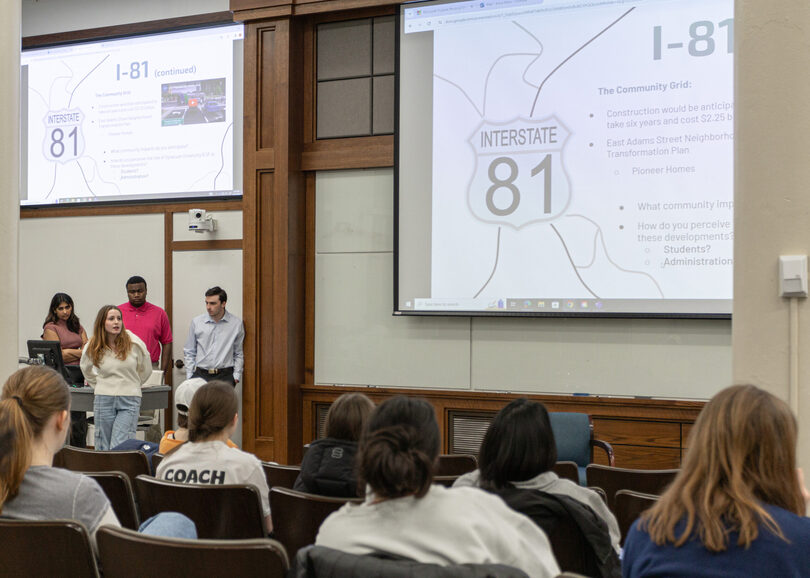Connect 315 reminds students community issues are closer than they realize

Joe Zhao | Assistant Photo Editor
Connect 315 is a club created to help "bridge the gap" between between students and the greater Syracuse community. Club leaders presented on I-81 at Monday's town hall, the group's first event.
Get the latest Syracuse news delivered right to your inbox.
Subscribe to our newsletter here.
UPDATE: This story was updated at 12:15 a.m. on March 21, 2024.
During the spring semester of their freshman year at Syracuse University, Anna Mirer and Leah Farrell took PST 101: An Introduction to the Analysis of Public Policy. Throughout the course, guest speakers involved in local policy frequently presented to the class and later spoke to the honors section, which both students were in.
After Sarah Walton, the director of East Adams Neighborhood Redevelopment for the city of Syracuse, presented to the class, she “challenged” the students in the room to propose solutions to various consequences of the Interstate 81 viaduct’s removal. When asked, Mirer and Farrell had no answers.
“She was putting forth some of the issues that (were) going to be happening with the (I-81) deconstruction, some of the resident displacement as well as some of the adverse health effects, and she was asking us how we would plan to solve it,” said Mirer, a sophomore studying policy studies, psychology and neuroscience. “Honestly, we were stuck.”
The two worked with other classmates to create a club to help “bridge the gap” between students and the greater Syracuse community after noticing the disconnect. Sophomore Tommy DaSilva, who would become the club’s specialty advisor, penned the name “Connect 315.”

Joe Zhao | Assistant Photo Editor
Connect 315 held its first public event — a town hall with around 20 attendees — Monday night in Lyman Hall focused on the ongoing I-81 teardown process. The I-81 project, the club’s founders said, doesn’t just impact those who live in Syracuse, it affects SU students.
Earlier this month, over a year after a lawsuit filed by “Renew 81 For All” halted progress on the removal of the I-81 viaduct, a state court dismissed the lawsuit, allowing the New York State Department of Transportation to proceed with its demolition and community grid replacement project.
“In the realm of civic discourse is a disconnect between the campus community and the greater Syracuse community at large,” said Connect 315 President Conor Murphy, a sophomore studying policy studies. “We feel like a lot of times, students are on vacation where they’re going to school. They’re not really getting involved, they’re not really fulfilling their citizen duties.”
The club’s executive team — consisting of Murphy, Mirer, Farrell, DaSilva and Marketing Director Anjana Dasam— developed the original plans for the club. Mirer said they met frequently on Zoom and texted back and forth over the summer to plan for the upcoming semester, establishing a constitution, for instance.
In addition to working to establish Connect 315, Vice President Mirer and Community Liaison Farrell produced a literature review on the consequences of the removal of I-81 over the summer in collaboration with Walton, which Mirer said they are hoping to publish in the next year.
The group chose to focus on I-81 because of their knowledge of the topic, its “interdisciplinary” interests and its proximity to campus, especially for students who live in Sadler Hall or Brewster, Boland and Brockway halls, DaSilva said.
“Both of these dorms and a few other ones, are right next to the viaduct. You have to literally go under the viaduct to get to your dorm,” said DaSilva, a sophomore studying policy studies, public health and citizenship and civic engagement. “We have students who are going to be impacted by this in some way or another.”
During the town hall, Murphy, Mirer, DaSilva and Dasam shared videos about the ongoing I-81 project and the viaduct’s history, which directly ties into racial redlining in the city.
Along with debuting the group, Connect 315 introduced three committees — media, operations and community outreach — that divide the roles and responsibilities of running the club and its community initiatives.
The media committee is in the process of producing a podcast, man-on-the-street videos and other marketing campaigns to involve students with the club’s community outreach efforts, said Dasam, who is in charge of the committee.
The group also plans to collaborate with other local and on-campus groups for community initiatives and volunteer opportunities. The involvement campaign, which has the tentative name “SU-nite,” is Connect 315’s “biggest deliverable,” Murphy said.
At the town hall, the group announced plans to collaborate with the CrossRoads Collective, a group that works with nonprofits on music-based programming and volunteering in the local community, for the first “SU-nite” initiative. The organization has open volunteer opportunities aimed at helping those affected by food insecurity, said Solange Jain, a representative for the group.
During the town hall, Murphy announced the group will host a panel on March 4 on the I-81 project. DaSilva said the panel will feature guest speakers that represent “varying perspectives” on the community grid project. The organization also plans to bring together community members for more town halls like Monday’s.
“I think that rhetoric is really important. Like I was saying before, the way that we talk about the community matters, the kind of conversations we have matter,” Mirer said. “And for me, it sometimes feels like (SU students) treat the community’s problems … as a nuisance.”
In one of their slides, Connect 315’s student leaders emphasized their club value of “Learning > Winning.”
“Learning (is) better than winning … to learn is a process. You don’t have to be right at the very start. Maybe it takes you a while to arrive at the right answer,” Murphy said. “And maybe you can get there quicker by bouncing ideas and perspectives off your peers.”





